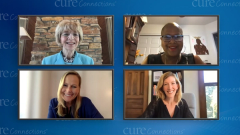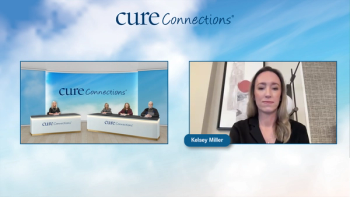
Coping with a Metastatic Breast Cancer Diagnosis
Julie Larson, LCSW, and a panel of women living with metastatic breast discuss the impact of the disease on mental health and resources to consider as a patient.
Episodes in this series

Shirley A. Mertz, MA, JD: As I said, I've been living with metastatic disease I guess since 2003. I have struggled with this idea of when am I going to die? How am I going to die? Well, how it will affect my family, et cetera. And finally, after listening to people speak who've been there before me or experts like yourself, Julie, I came to the conclusion, all I had control of was the day that I'm given when I get up in the morning. I try to embrace that day. I heard a wonderful lady. There was an organization that called Y-ME and she began the discussion by saying, "I still buy green bananas." And that stuck in my mind because it means you're hopeful that those bananas are going to ripen. And I think- And I've worked in so respect with both Lisa and Sheila. I think we both found purpose in our advocacy work. I'm sure they found purpose in many other things, but there is a lot of joy of being with people who understand where you are. I think the one issue about existential issues or how to deal with it, is I would be very sad when I heard that someone that I had worked with passed away from metastatic breast cancer. And if they had my subtype, oh gosh, does that trigger? I thought she had that, and I have that. And then I came to the conclusion, I'm a statistic. Yes. When I die, I'll finally appear in the steer database. But I am a statistic of one because I have a unique metastatic breast cancer type. And we all do, even if we all, three of us had the same type, subtype. We all would be unique. Plus, we have the same- we had different comorbidities. I have a tendency for blood pressure. Maybe someone else has something else. I like to tell people; you are a statistic of one. Everybody's cancer is different, different co-morbidities. So sometimes people will pass away from before. But that doesn't mean that you're going anywhere tomorrow. I hope that would help some of our listeners. Julie, since you deal with psychological and emotional issues of metastatic breast cancer, what do you share with your patients who seek your care, that might be helpful to our listeners. We're drawing to the close of this segment. And if there's something that- For example, I would assume that you would like them to seek counseling and sometimes oncology practices don't even talk about counseling or resources. So how do they sort through that?
Julie Larson, LCSW: Yeah, I think that one of the things that is helpful to a lot of people's cultivating what I call your all-stars, all-stars support team. Who's on your team? And your team is going to be made up of a lot of different individuals are different types of individuals. First, all you've got your medical professionals, that's your oncology and the nurses. And you know that the person that you talk to and ask questions with may or may not be oncologist, it might be that really great nurse on your team. Who do you turn to? Who do you ask questions within that oncology cancer center? And then who's in your peer-to-peer. You're going to get a very different type of support from that peer, I mean other survivors. So where do you find that? And maybe that and then that professional team could also include a therapist or a counselor. That's certainly where I enter the picture. I don't think, you don't have to go to somebody that has a specialty in oncology in cancer. I think sometimes it helps though. I think my background in really understanding oncology, I know the way a cancer diagnosis impacts so many different areas of your life. Your family life, your professional life, your intimate life, you’re all these different places. And I also already know treatment plans and drug names and typical side effects, you don't have to do a lot of time educating me. But sometimes that's not available. I also think that our friends and family, sometimes we think oh, well they may not have anything to add here. But they have known you a long time and they know how you cope; they know that when you get upset you hide. And they know when to reach. They really are whatever you do, right? Our friends and our family have a historical knowledge about us that's pretty important too, so. And when you think about this whole, so I kind of frame it as your whole team, you have all the players in your team.
Shirley A. Mertz, MA, JD: Great. Go ahead Lisa, I see you want to make a comment.
Lisa Laudico: Yeah, so thank you Shirley. Julie, everything you said I totally agree with. I would only add that supportive care needs to be something that we talk about more. Sometimes it's called palliative but really, it's supportive care and integrative care, and the newly diagnosed need to be tapping into that right away. You talk a little bit about sexual health, and you intubated it. That's part of it too. People, oncologists, are there to keep us alive and their jobs are so important, and so often they don't ask all the questions that we need them to ask to find out. And we're just diagnosed, and we don't know what to ask because we're drinking from a fire hose. It's like oh my gosh this is incredible, but we're in shock so. Our oncologists are there to keep us alive and then we have to have, as you said, I think you called it your A-Team. That has to include other medical professionals who are part of your, you know therapists, psychiatrists, psychologists, supportive medical professionals, pain managements. All of that stuff needs to be encompassing the individual living with mBC. I think that's not talked about enough and so I just wanted to add that, because I think everything you said, Julie, was right on the money.
Sheila McGlown: Not to. Just want to say, Shirley, a year and a half ago I started seeing a therapist. Because it came up, it was my ten year and I was just like this is some heavy, this is heavy. Cancer is heavy. They had been on this clinical trial and the nausea from that I was just. I started seeing her and I tell you what, that was the best thing I've ever done. Because I figured it out, it's OK to not be OK. In April, I broke my femur and I fell into a deep depression. Not only did I have to not worry about catching Covid, and then I had to worry about going to treatments because I couldn't do Telehealth, so. Then I had to worry about a broken femur, I didn't even know I had a femur. But I fell in Target, and I fell into a deep depression and I just didn't know. I text my therapist and I was like, I just can't deal with this anymore. And man, I'm telling you, it was the best thing that I ever did because I can call her anytime and just be like, I can't cope, I just need. And it's just all, what people forget it just because you have cancer life doesn't stop. You still got to deal with other outside things, so it's OK to see a therapist. You are not alone. I see one and I tell you what, it was the best thing I ever did. And I'm grateful to God that I'm, she's there for me whenever I call her. And like I said, it's the best thing I ever did. So, thank you.
Lisa Laudico: Amen to that. Mental healthcare I think needs to be right up there first thing.
Shirley A. Mertz, MA, JD: OK Julie, go ahead. Quickly.
Julie Larson, LCSW: I think we've got a mystery about what happens behind that closed door. We say go to therapy; I don't know what that means. It's like a big, giant, vague mystery behind that door and I think what you're saying, Sheila, is that it often. I often say to people, my space is safe, and it is reserved for you, and so often I am just bearing witness. I am a place where you get to lay it out there and I'm going to bear witness to what's going on for you, and sometimes I'm a mirror. I, people forget who they are, they forget how the heck they're putting one foot in front of the other. And I'm saying, do you see this about you? Because I do. And I think that that is a little bit demystifying what therapy can be. It's many things and it can be short term stressors and then it can go deeper into looking back in your life history. But I think in many ways it's a safe, bottom of the end of the day it's a safe space.
Shirley A. Mertz, MA, JD: Thank you, that was so important. And to bring this to a close, I just want to emphasize two points. One, Lisa brought up the word palliative care. Please, if you are a newly diagnosed patient, palliative care does not mean that you are receiving end of life care. That is called hospice. So palliative care, as Lisa said, is something you should ask about from the beginning. Whether you're having trouble sleeping, you have pain, you're not having sex anymore and you'd like to. All those things are important, right? Sheila, it's fun, right, to talk about. Even for an old lady like me, but anyway. And the other thing is, if your doctor doesn't bring that up and then just comes in the room with a result of a test, think about maybe you need a different doctor. Get a second opinion. And you might find out that the second opinion is somebody that you feel more comfortable and trust better than the first.
This transcript has been edited for clarity.




